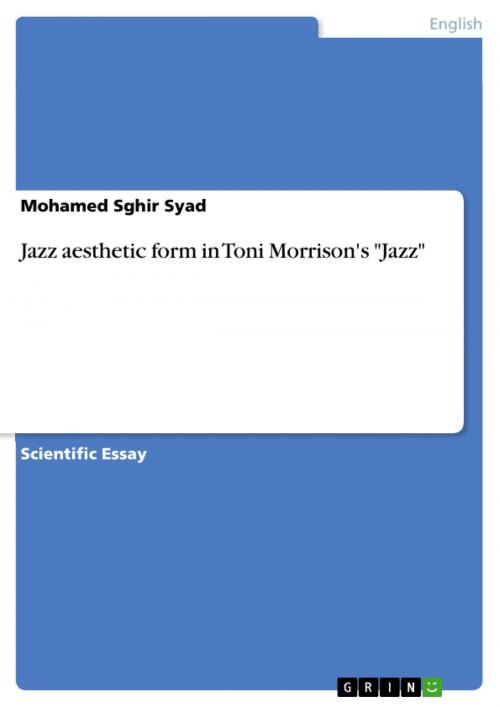| Author: | Mohamed Sghir Syad | ISBN: | 9783668192560 |
| Publisher: | GRIN Verlag | Publication: | April 11, 2016 |
| Imprint: | GRIN Verlag | Language: | English |
| Author: | Mohamed Sghir Syad |
| ISBN: | 9783668192560 |
| Publisher: | GRIN Verlag |
| Publication: | April 11, 2016 |
| Imprint: | GRIN Verlag |
| Language: | English |
Scientific Essay from the year 2014 in the subject American Studies - Literature, University of Nottingham (School of Canadian and American Studies), course: American Studies, language: English, abstract: This text attempts to explore Toni Morrison's strategic negotiation between essentialism and anti-essentialism in regard to the re-appropriation of African American musical aesthetics in fiction. The text also tries to examine how Morrison's dual-stance positioning demonstrates the conscious strategy of achieving the double goal of recovering African American and female voices as well as of critiquing hegemonic cultural logics about race and gender. To this end, I draw on some critics and musicians representing contending views regarding the cultural origins of jazz to argue how Morrison employs the music as a concurrent aesthetic/cultural metaphor for blackness and for American diversity through the re-appropriation of jazz characteristics in Jazz. As a whole, the text considers that the motivations behind Morrison's accommodation of the two stances in her fiction are related to her strategic positioning that offers fruitful possibilities for mediating affirmations of difference and the necessity of racial, gender and cultural group politics.
Mohamed Sghir Syad has a Licence in English Language and Literature (Hassan II University, Casablanca, Morocco), an MA in Drama and Theatre (The School of Comparative Studies, Essex University, UK), and a PhD in American Studies (The School of American and Canadian Studies, University of Nottingham, UK). He lectures at Cadi Ayyad University and Sultan Moulay Slimane University (Beni Mellal, Morocco), and is currently director of The Research Laboratory in Culture and Communication at Sultan Moulay Slimane University. His current research interests include Critical Race Theory, African American Studies, Women's Writing, Feminism and Postmodernism.
Scientific Essay from the year 2014 in the subject American Studies - Literature, University of Nottingham (School of Canadian and American Studies), course: American Studies, language: English, abstract: This text attempts to explore Toni Morrison's strategic negotiation between essentialism and anti-essentialism in regard to the re-appropriation of African American musical aesthetics in fiction. The text also tries to examine how Morrison's dual-stance positioning demonstrates the conscious strategy of achieving the double goal of recovering African American and female voices as well as of critiquing hegemonic cultural logics about race and gender. To this end, I draw on some critics and musicians representing contending views regarding the cultural origins of jazz to argue how Morrison employs the music as a concurrent aesthetic/cultural metaphor for blackness and for American diversity through the re-appropriation of jazz characteristics in Jazz. As a whole, the text considers that the motivations behind Morrison's accommodation of the two stances in her fiction are related to her strategic positioning that offers fruitful possibilities for mediating affirmations of difference and the necessity of racial, gender and cultural group politics.
Mohamed Sghir Syad has a Licence in English Language and Literature (Hassan II University, Casablanca, Morocco), an MA in Drama and Theatre (The School of Comparative Studies, Essex University, UK), and a PhD in American Studies (The School of American and Canadian Studies, University of Nottingham, UK). He lectures at Cadi Ayyad University and Sultan Moulay Slimane University (Beni Mellal, Morocco), and is currently director of The Research Laboratory in Culture and Communication at Sultan Moulay Slimane University. His current research interests include Critical Race Theory, African American Studies, Women's Writing, Feminism and Postmodernism.















